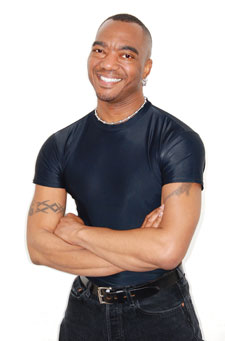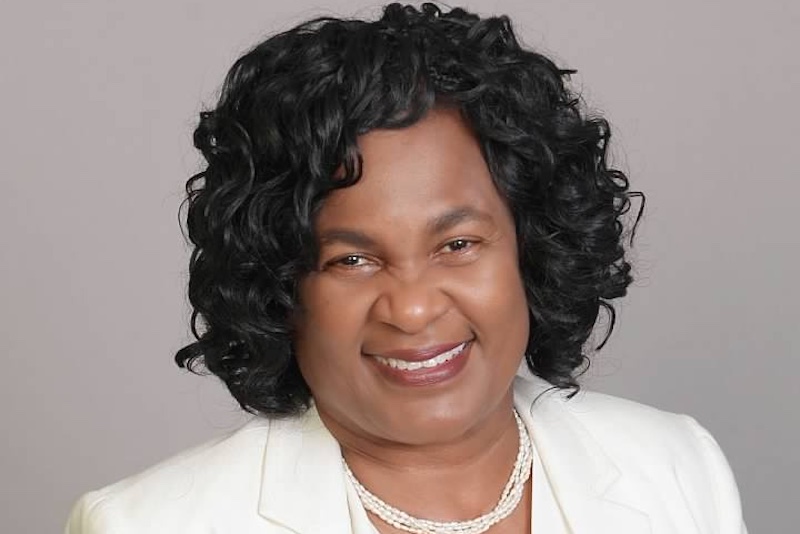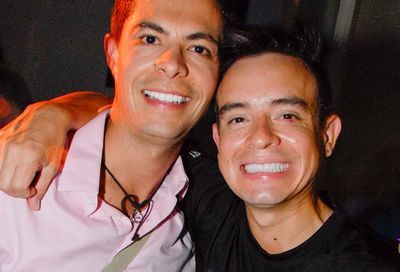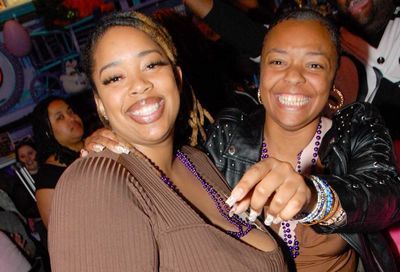Dr. Phil
Philip B. Terry of PreventionWorks! shares insight on risk reduction, HIV and finding calm amid emergencies
Dr. Philip B. Terry has a hero: his grandmother. She instilled a simple message in her grandson — that he should be and do his best. Earning his doctorate at 27, to go with that master’s degree, her message seems to have stuck.
Terry has also served his country in the Army Reserve and as a longtime volunteer for the Red Cross, learning firsthand the toll that disasters and emergencies can have on communities and individuals. Those experiences, along with his somewhat ”tough love” sensibility that made his run as a private-practice therapist a losing proposition, have not hardened him. Living in HIV’s American Ground Zero, leading an organization that goes to people wherever they may be in their struggles, in hopes of reducing risks to their health, he is not cynical about National Black HIV/AIDS Awareness Day this Saturday, Feb. 7.

Philip B Terry
”We may lose focus by having so many days, months and weeks where there’s a proclamation of some sort,” he grants. ”But if even for that moment we’re shining a spotlight on the issue — in this case black HIV/AIDS — it helps keep people mindful, helps keep at the forefront that this is something we really need to look at, address and fight for.”
Since November, Terry has been leading the fight on one front as the new executive director of PreventionWorks!, a local nonprofit organization begun a decade ago to advocate for needle exchange as a method for curbing HIV infections in the District, despite federal resistance that banned District funding for needle exchange. But that ban is gone now, making the efforts of PreventionWorks! a little easier. But there’s still a long way to go. Terry seems more than eager to go the distance.
METRO WEEKLY: Looking at your résumé, you’ve focused much of your attention on youth. You’ve been involved with groups helping homeless youth, young men in trouble with the law, kids with behavioral and emotional problems….
PHILIP B. TERRY: I’ve always had a fondness for working with teens, in particular. I like working with populations that, typically, other folks don’t want to touch. I find it’s exciting work.
My doctorate is in human services with two sub specialties: One is child and adolescent development. The other is organization and community development. There are not a lot of differences between the two. If you look at communities and organizations as organic beings, just like humans, we all go through developmental cycles and stages. Having an understanding of those cycles and stages is relevant both for watching a person go from birth to adulthood, and watching an organization go from inception to its adulthood.
MW: What about your own youth and coming out?
TERRY: I’ve known since I was young — really young — that I was gay. I came out, really flying out, when I was 17 or so, while I was in the Army Reserve. This was before ”Don’t Ask, Don’t Tell.” I came out to my parents later, but I was never really closeted with them. I was in a long-term relationship for years and my parents knew that, but we never had ”the conversation.” I wasn’t necessarily closeted, but it wasn’t an open discussion. It was really a non-issue. Certainly it wasn’t a topic of discussion with my mom and me. Now, with my dad — they divorced, they’d been separated for years — we had a conversation when I was 20 or 21.
MW: In American mythology, Dad is usually the strong disciplinarian, while Mom is the soft touch. It sounds like your parents’ roles were reversed.
TERRY: Yes, it was just reversed. My mother was military, while my dad was actually a conscientious objector during the ‘Nam years. He’s still not very keen on military service. But he accepted it when I went in. Dad’s pretty easygoing.
For my family, we were always very close, even though my mom and dad are divorced. The relationships have been really good. Even with the divorce, they’ve been very close.
MW: Their emotional maturity must have made an impression on you growing up.
TERRY: Yes, in recognizing that relationships can change and end, that people can move on. That’s a value I hold high. There’s a level of maturity with that. When a relationship isn’t right, to be mature enough to say, ”This isn’t working, this isn’t right for me, this isn’t healthy.” And to have the ability and the energy to end whatever isn’t healthy and move on, in a healthy and respectful way.
I never really gave conscious thought to it, but I guess I could look back and see my parents as modeling that. Even though they were no longer together, there was still love. They took equal responsibility for my upbringing. They probably hang out more today than they did when they were married, which I find ironic. I teased them that they waited till my 45th birthday to take me out for my birthday for dinner.
MW: Did that sort of maturity serve you well during 9/11? Were you the senior director of emergency services and international services for the National Capital Area of the Red Cross then?
TERRY: I was with the Red Cross in a paid position from 2002 to May of 2008, but I was a volunteer since I was kid.
[With 9/11,] I started as a mental-health supervisor for the midnight shift here at the Pentagon for the first three or four days. Then I went on a special-assignments team that would go to different government contractors and agencies around the Pentagon. I also was a supervisor for the memorial that was held here for the Pentagon victims. The day after that, I got called to New York and I supervised the respite sites on either side of Ground Zero.
I was doing the ”traveling professor” thing at a couple universities and I was a part-time instructor at a high school, so I took a leave of absence from those positions and did my piece.
It started on Sept. 12. I stayed through mid-November or early December, almost full-time, almost every day. In New York, I stayed up there for about a month.
MW: How did that work affect you?
TERRY: It was draining. It was trying. There were times when I just had to spend some time alone. I have some respiratory conditions from Ground Zero I’m under treatment for. I’m part of a World Trade Center health-monitoring program. But it impressed me professionally in that it was a complete change for me. I was teaching college at the graduate level. I was quite happy being part-time instructor and theater director at the high school. I was making a very comfortable living doing these part-time gigs. Because of my work around Sept. 11, and then the year later when we had the sniper incident and I was mental-health director for the Red Cross for all of that as well, the chapter reached out and encouraged me to apply for the position that was opening here in D.C. as executive director. Then I transitioned from that to senior director for emergency services. Professionally, it kind of changed the direction of my career. It got me energized about the work around empowering people.
I don’t regret a minute of that work. It changed me profoundly. It had both profound mental-heath and physical-health implications for me, but I don’t regret it. I’m really proud of the work that we did, really proud of my involvement.
MW: How does that experience translate to your work at PreventionWorks, with the District being in an HIV/AIDS state of emergency?
TERRY: First off, it’s about empowerment. When you think about emergencies, whether it’s an emergency response for a disaster or a response to a health crisis like we’re in here in the District, we want people to have tools they can use to get themselves to a different place. So when I think of my work as emergency-services director with the Red Cross, it was my task to help every citizen and every business in this city to be prepared for the next emergency, to have the tools, to have the resources, to have the supplies, to have the kits you’ll need. It’s empowering people and teaching them that’s important.
How does that translate to my work with PreventionWorks now? Every client who comes to us is lacking the tools to keep their health in shape, or the tools to get them to a different place in terms of their health care. What folks really need is not a handout or a hand up, but empowerment. Take control of your life. Take responsibility for taking care of yourself and getting to that next place.
MW: The tool that comes to mind with PreventionWorks is needle exchange. What else should come to mind?
TERRY: Harm reduction. We started out as the program that did needle exchange, but that’s part of a larger concept of harm reduction. Just break it down. It’s encouraging people to engage in behaviors that minimize the risk and harm from other behaviors.
The one thing we know is that people are going to do things to feel good. People are going to get high, people are going to have sex — all these things that are part of the human experience. If we recognize that and we honor that and we provide people with the tools to engage in those experiences with a minimum amount of harm to themselves and to other people, then that’s a feather in our cap.
Think of motorcycle laws. I love to ride a motorcycle. I would love to ride it without a helmet. That’s not the smartest thing in the world to do. If you ask an avid cycler, none of us like to wear helmets, but we recognize that in an accident the likelihood of injury is minimized. I’m reducing the risk of this behavior that everyone acknowledges is dangerous.
I wrecked my bike last spring. Nothing too severe, not life threatening. There was a gash here, some sutures there. It avoided the new tattoo — that was important. What am I conscious of there? I’m conscious of the fact that I had on my helmet, and I had on protective gear on the upper part of my body. There was absolutely no injury to the upper part of my body. What got injured? The leg. I was going to a meeting so I had on dress pants. I wasn’t wearing jeans or chaps. That’s what got cut up. The pants were shredded beyond recognition. I saved them to remind me: ”You know what? Throw on your chaps.” That’s all it would’ve taken.
So when I think of the work, of harm reduction, of PreventionWorks, if giving some condoms or safer-sex kits, or exchanging a needle….
We’re certainly encouraging folks to get into treatment, go to detox, but if they’re not there yet, if they’re not at that place, if the best I can do today is get them to use clean needles and to bring those needles back so that we can dispose of them properly so they’re not left on the playground where kids can get them, so that they’re not in the dog-walk parks, then we’ve changed so much about how not only HIV, but also hepatitis C, is affecting our city.
MW: Going back to those chaps, you’re also a pretty well-known face in the leather community, one of the GLBT rainbow’s most philanthropic subsets. Have you drafted leatherfolk into the PreventionWorks mission?
TERRY: The leather community is an interesting group. It’s a fellowship, a very fraternal organization. I’ve already called on my D.C. Boys of Leather brothers to come down and help. They actually helped put in the IT infrastructure at the new office. Through Facebook, other outreach, quite a few of the brothers have made contributions to PreventionWorks.
MW: Prior to this interview, I last saw you at Mid-Atlantic Leather Weekend. From your harm-reduction point of view, I’m curious to know your opinion of Americans For The Truth About Homosexuality managing to get a private orgy slated for a quasi-public space cancelled. From the community, you hear arguments hitting on sexual freedom or criticism of this sort of extreme sexual behavior tarnishing the movement’s equality activism.
TERRY: I am of the opinion that people have the right to do what they want to do in privacy and that it really isn’t anyone’s place to judge, in general. I’m a supporter of sexual freedom. Obviously, from the work I’m doing at PreventionWorks, I recognize and honor that humans are going to do things that humans do.
As Nancy Grace says, ”When you’re pointing a finger, there are four more pointing back.” [Laughs.] That’s so true. How can I tell someone not to have a private sex party? Should it be in a public place? No, I don’t think we should have ”public orgies.” But was it public? No. It was a private venue of rented space. No one else was going to be there. I think that as Americans in a free society, we have a right to assemble like that. But there’s also responsibility. As participants in activities, we still have responsibility for our own health, our own well-being, and the health and well-being of our sex partners and people we’re going to be with.
I don’t think as a society we have a right to tell people what to do or how to do it. But we do have a right to expect that people are going to be responsible.
MW: There is certainly stigma around sex. Many people fighting HIV in D.C. point to that stigma as an enemy in the fight. Is needle-exchange stigma similar?
TERRY: There is a stigma around injection-drug use in general. Typically, when we think of needles, we think of people that are using heroin or any of the more commonly known injection drugs. [But] there are lots of populations that people don’t even think about. Are there kids shooting steroids? We don’t have any hard data on that, but my suspicion is — anecdotally and working with young people in some of the surrounding counties — yeah. Are there transgender folks using needles for silicone injections or other body modifications? Yeah. Are there people using needles to do piercings? Yeah.
You have layers: I’m a drug user. I’m an injection-drug user. I might be HIV-positive, or I am HIV-positive and I might have AIDS. I might be transgender. You have all of these different layers, and each has a different stigma or a different bias or prejudice attached to it. It’s really tough to overcome.
Because we’re a ”harm-reduction modality,” not a treatment program, our folks are still actively using, whereas most of the facilities in the city are abstinence programs. People are expected to be abstinent from substance use to receive whatever the program is offering, whatever services. We’ve encountered issues of helping folks move toward that point of abstinence, just getting referrals they may need from a program that adheres to an abstinence-only model. There’s an immediate barrier there. We have to advocate, we have to fight to get whatever services they need.
MW: When you do get PreventionWorks clients to that point where they can move to the next level, so to speak, are there adequate resources waiting for them?
TERRY: They’ve improved significantly. The ability to move people from detox to another intake process, to move them into treatment, has improved tremendously in the city. I don’t have exact figures, but I know that there have been tremendous strides in moving people quickly through the process. It’s been the last four or five years that it’s improved. The city’s put more attention to it. There’s been a concerted effort.
[City Councilmembers] David Catania (I-At large) and Jim Graham (D-Ward 1) have been keen on making sure that there’s access to treatment, that if people express the need and hit an intake unit, they can move very quickly into detox or a treatment program.
MW: How do you want PreventionWorks to grow?
TERRY: I want to see more harm-reduction centers. I’d love to see another physical facility or two open. I’d love to have another mobile unit out there on the streets so we can double the number of folks we’re seeing now. Even with the community programs that are now doing needle exchange, there is so much work to be done that we can complement each other beautifully and nearly blanket the city with services for folks.
And I want to continue to empower that notion of harm reduction. I’m also not talking about reducing diabetes and high blood pressure and obesity and teen pregnancy — there’s a whole list of health concerns we have in this city. So I see us kind of growing the program, not to lose sight or focus of our target population — because that’s our specialty, that’s what we’re very good at — but to also be a health resource in the communities that we’re serving.
We do need more resources around health care and prevention. We need to erase at the federal level, and any remaining local level, barriers to safe-sex supplies. Condoms should be at every bus stop. Wouldn’t it be great if you could get clean needles for whatever you’re using them for? Diabetes, whatever. Local governments are permitted to use their own dollars, but there’s still a federal ban [on funding needle exchange]. That needs to change. Are we doing what we need to do with drug policy in this country? No. Needs to change.
We need to recognize this is part of the human experience. It always has been, it always will be. Prohibition didn’t work. Abstinence doesn’t work. Let’s get some fresh approaches and stop pretending these issues don’t exist.
It’s going to take a while to get the issues changing, but I think there’s incredible synergy with the ban being lifted in the city and the availability of city dollars [for needle exchange]. There’s great synergy around the health policies that the Obama administration is espousing. It’s way too early to tell where they’re going, but the conversation is moving in the right direction.
I think it’s a great time for me to come into PreventionWorks. It can come together in the next couple years and really make a difference on all these issues. People know Prevention Works as a needle-exchange program, and that’s where we started, but it’s so much more now. Needle exchange is just one of a host of things that the organization does simply to help people get to another place in their lives.
MW: Is there a parting thought you’d like to leave readers?
TERRY: Watch out, because I’m going to ask you to do something to make a difference — in your own life, in the life of the city that we all love and enjoy, in the life of your neighbor. We’re all responsible for each other, and ourselves. You have been warned.
While PreventionWorks! includes an exclamation point in the organization’s name, it has been omitted in most instances in this interview for clarity.
Support Metro Weekly’s Journalism
These are challenging times for news organizations. And yet it’s crucial we stay active and provide vital resources and information to both our local readers and the world. So won’t you please take a moment and consider supporting Metro Weekly with a membership? For as little as $5 a month, you can help ensure Metro Weekly magazine and MetroWeekly.com remain free, viable resources as we provide the best, most diverse, culturally-resonant LGBTQ coverage in both the D.C. region and around the world. Memberships come with exclusive perks and discounts, your own personal digital delivery of each week’s magazine (and an archive), access to our Member's Lounge when it launches this fall, and exclusive members-only items like Metro Weekly Membership Mugs and Tote Bags! Check out all our membership levels here and please join us today!




















